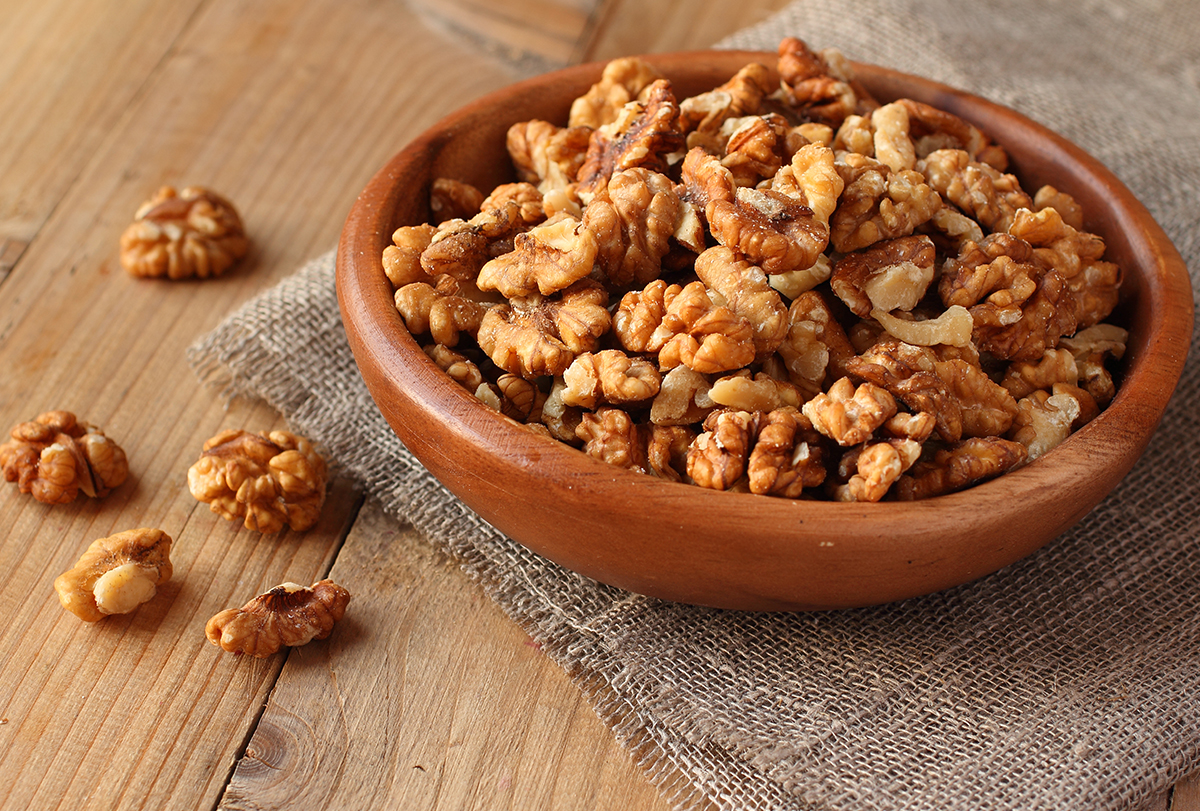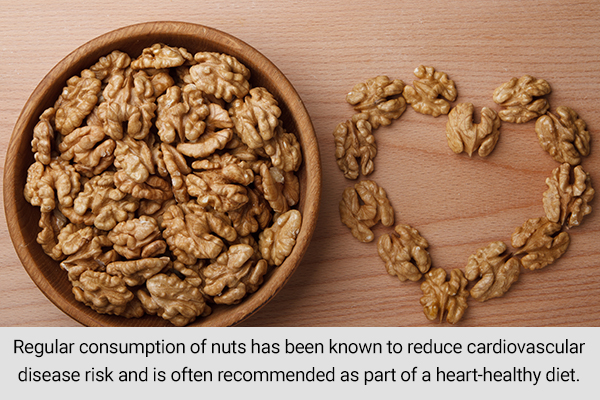In this article:
Walnuts are a popularly consumed nut that is obtained from trees. It is a light-brown nut that looks like the brain and is located inside a hard shell that must be broken before consumption.

They are among the most recommended nuts and rightly so because they have rich nutritional and fatty acid profiles that are beneficial for chronic illnesses of the heart, type 2 diabetes, age-related diseases and degeneration, and even certain types of cancers. (1)
Nutritional Profile of Walnuts
A typical serving of walnuts is roughly 5–6 halves, which can give you 131 calories, 13 g of fat, 1.3 g of fiber, and 3.1 g of protein. (2)
They are rich in minerals, such as copper (with each serving providing 36% of the daily requirement), manganese (30% of the daily requirement), magnesium (31.6 mg), zinc (0.6 mg), and phosphorus (69 mg). (2)
Health Benefits of Walnuts
Here are the health benefits walnuts can offer.
1. Boosts heart health

Regular consumption of nuts has been known to reduce cardiovascular disease risk and is often recommended as part of a heart-healthy diet.
Public health studies evaluating nut consumption over a long period and the outcome of heart diseases found that the more walnuts consumed, the lesser chances of developing heart diseases. (3)
The study also concluded that consuming one serving of walnuts (28 g or 5–6 halves) one or more times a week can reduce heart disease risk by 13%–19%. (3)
2. Reduces blood cholesterol levels
Nuts in general are rich in beneficial fatty acids, polyphenols, vitamin E, and folate, which provide the body with good-quality fatty acids essential for many bodily functions.
Walnuts in specific are rich in omega-3 and omega-6 fatty acids that possess anti-inflammatory and anticholesterol properties. (4)
The result of multiple studies has shown diets rich in walnuts reduce total cholesterol and LDL (bad cholesterol) levels significantly without affecting weight or blood pressure. (4)
3. Helps in the management of diabetes

Along with improving heart health, walnuts also aid in the management of diabetes.
Multiple large-group studies have found that regular walnut consumption (10–12 halves three times a month) was found to reduce the risk of type 2 diabetes in women. (5)
4. May aid in weight loss
Nuts are rich in protein and fiber, which are necessary in a weight reduction diet.
In a study of adults with overweight and obesity, when 15% of the daily energy intake of the participants was via walnuts, they lost body weight, BMI, and waist circumference.
In addition, as compared to a standard energy-reduced diet, the walnut-enriched diet improved the risk of heart disease and reduced LDL (bad) cholesterol levels. (6)
5. Improves gut health
In addition to aiding weight loss and improving overall health, walnuts can also alter gut microorganisms to boost digestive health.
In a study of 194 women, a walnut-enriched diet (43 g/day) for 8 weeks led to improvements in beneficial strains of gut microorganisms. (7)
In a separate study involving men and women, 42 g of walnuts each day for 3 weeks resulted in similar results, where the amount of beneficial gut microorganisms was significantly higher. (8)
However, 43 g of walnuts comprise over 20 walnut halves, and it might be difficult and economically difficult for people to consume.
6. Supports brain health

Walnuts are housed inside a hard shell similar to a brain, so it must mean it is good for the brain, right? This assumption is actually right. Walnuts do contain nutrients that are important for brain health and reduce cognitive decline.
Multiple animal and human studies have found walnuts to reduce the risk or progression of brain diseases such as Parkinson’s disease and stroke. (9)
Recent animal studies have found walnuts to improve antioxidant activity and reduce the chances of developing proteins that cause Alzheimer’s disease. (9)
7. Boosts mood
Walnut’s brain-protective compounds, which include vitamin E, folate, melatonin, polyphenols rich in antioxidants, and omega 3-fatty acids, significantly impact mood. (10)
In a study of college students, consumption of walnuts for 8 weeks led to a significant improvement in overall mood. (10)
Lower depression scores were also observed in walnut consumers during the National Health and Nutrition Examination Survey done in the United States. (11)
8. Improves fertility
Infertility affects approximately 8%–12% of couples with 40% attributed to male-related factors. (12)
Walnuts contain compounds that boost sperm production. In a study of men between 27 and 61 years old, consumption of walnuts for 3 months improved the production and motility of sperm. (12)
9. Boosts skin and hair health

Nutrition plays an important role in maintaining skin and hair health.
The omega-3 fatty acids and vitamin E in walnuts aid the production of new cells in the skin. Their antioxidant polyphenols can prevent damage to the skin caused by free radicals and also can help in maintaining a youthful appearance of the skin. (13)
The minerals and fatty acids of walnuts also preserve hair health by building hair strength and preventing breakage, especially in postmenopausal women. (14)
10. May protect against cancer
Walnuts have also been known to reduce the risk of several types of cancer including prostate, colon, and breast cancers. (15)(16)(17)
Studies have found a single serving of walnuts (40 g or 8–9 halves) can alter cancer cells to prevent their growth and spread and ultimately reduce the size and survival of tumor cells. (17)
How to Consume
Walnuts can be eaten by themselves as a snack, can be roasted, and can be added to salads, smoothies, gravies, bread, and granola mixes.
Most-Asked Questions About Walnuts
Who should avoid walnuts?

People with an allergy to nuts should avoid consuming walnuts.
When should I consume walnuts?
There is no scientific recommendation on what time of the day is best for consuming walnuts. However, many traditional schools of medicine believe in consuming overnight-soaked walnuts first thing in the morning for maximum benefit.
Can walnuts lower blood pressure?
No studies have reported walnuts’ role in lowering blood pressure. However, its general impact on improving heart health may also extend to better blood pressure control.
How many walnuts should I eat in a day?
Seven walnut halves should provide beneficial health effects. Remember, walnuts are rich in fiber and fat, so overconsumption may lead to diarrhea, stomach distress, and weight gain.
Final Word
Walnuts are among the most widely consumed and favored nuts. They have many health-boosting properties and are mostly used for their role in managing cholesterol levels, maintaining heart health, and improving brain function.
In the young adult population, which is mostly likely to suffer from depressive disorders and low mood, walnuts can improve the outcomes of depression and overall mood.
In the aging population, walnuts can be used to prevent age-related cognitive decline and delay the progression of diseases such as Alzheimer’s disease and Parkinson’s disease.
- Was this article helpful?
- YES, THANKS!NOT REALLY


